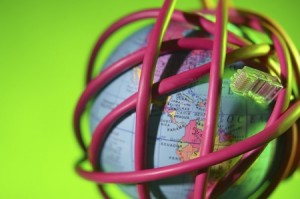Guest Post: Are Attacks on Online Freedom Really Making Us Safer?

If you’ve ever tried to access a website and found that it was blocked, you may have been a victim of governmental internet censorship or restrictions. The theory behind both of these practices is that they keep us safer and protect people against internet piracy, which is so rampant in our modern-day society. Such restrictions can be frustrating, especially if you’re travelling internationally. In some countries, you can access your favorite sites; in other countries, you can’t. But also, just knowing that a whole world of content is out there that you’re denied access to can be frustrating. Let’s take a look at restrictions on online freedom and how they affect you:
Know What’s Happening
Many people are unaware that their internet access is being restricted. It’s easy to remember that restrictions exist in places such as North Korea, Cuba, and China, but even in the United Kingdom, you’re at risk for being prosecuted for what you do online. And in America, anything you do on the internet, illegal or not, can be tracked. Actually, internet service providers have even been known to block people who are torrenting, regardless of the legality of the torrents that are being downloaded.
There are a few different kinds of restrictions that you might encounter. For example, you often will see government restrictions, which could happen for a variety of reasons, but are usually meant to keep people from accessing content that’s either considered too politically charged or scandalous. Also, sites such as Netflix, Hulu, or YouTube often employ geo-restrictions, which keep people from accessing a certain type of content in foreign countries because of possible copyright restrictions. But it’s not just the internet or your service provider watching you; even email providers such as Gmail admit to reading through your emails in search of keywords to help them target advertising for you. And every time you visit websites, they collect packets of information called “cookies” that tell them about sites that you visit frequently and how often you’ve visited their site. So basically, any time you use the internet, your online history is on display for the world to see.
Know The Reasons Why
A lot of people argue that internet censorship not only protects artists, but also protects people from seeing things they shouldn’t be seeing. If torrenting sites are blocked, the number of people illegally downloading albums may drop. And if certain sites are blocked from showing up on search engine results, you might find that the number of kids viewing porn sites or other inappropriate sites may drop. The thing is, the reasoning behind most internet restrictions is pretty legitimate, although the consequences can be unpleasant. Sites are trying to protect artists, the government is trying to protect children, and your email provider is trying to keep you interested in the advertising that is shown to you. But this gives a really skewed view of the internet, which was originally intended to allow free access to everyone.
Know That Legislation Is Constantly Changing
And one of the things that is the most frustrating to people is the fact that legislation continues to change. For example, the Australian government recently passed legislation that makes torrenting illegal. Of course, this is meant to cut down on the number of illegal torrents downloaded, but not all torrenting is done to share copyrighted music, movies, or applications. Instead, it’s just a great way to quickly share large files, which can be incredibly useful for people who work remotely, want to share photos with family members, and so on. Countries and websites are doing more to inhibit your ability to access information and express yourself, and experts believe it’s only going to get worse as more precedents are set. But are we really any safer because of this sort of legislation?
Know That There Are Ways Around It
As with many things, though, tech masterminds have figured out ways to get around censorship and geo-restrictions. One of the most common ways of doing this is by using a VPN, which will hide your IP address and give you a better-shielded internet connection. It does this by creating a sort of tunnel that your information goes through, and it limits sites and any other prying eyes from seeing what you’re up to. Unfortunately, it’s not 100 percent foolproof, and as this method becomes increasingly popular, there are restrictions on using a VPN as well. For example, the UAE has outlawed their use, and Netflix has threatened to ban subscribers who use a VPN to bypass their geo-restrictions. But it’s difficult to enforce these rules in all cases, so even if attacks on online freedom are making us safer, those who really want to do something illegal can usually find a way.
The real question we need to ask ourselves is what we’re protecting ourselves from and whether that protection outweighs our desire to freely access the internet and freely express ourselves. Attacks on online freedom may limit the amount of inappropriate and illegal content that’s out there and may protect people in times when a politically-charged message could cause havoc, but then again, you don’t close all the shops in the world because someone might steal something.
What You Can Do
The internet is becoming increasingly more restricted each day, but there were no real restrictions on the internet originally. If you want to maintain your digital freedom and hopefully return to a free and open internet experience, it’s going to require action. While you can use tools to work around the current restrictions, that may not change anything for the future. Contact lobbyists and your local politicians to express your feelings on the subject and implore them to fight back against censorship and internet restrictions in the name of freedom. Thanks for reading.
This article was written by Isa C. Isa is an internet security expert and tech blogger. She enjoys writing about everyday security for the layperson, defending online privacy and the latest tech tips.




